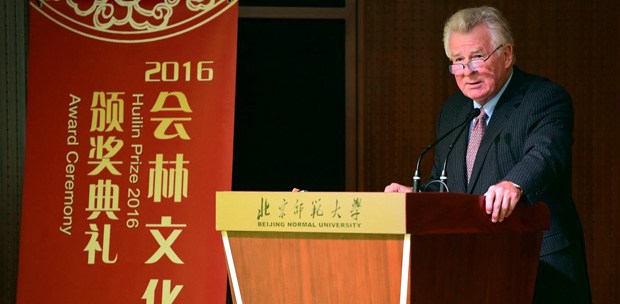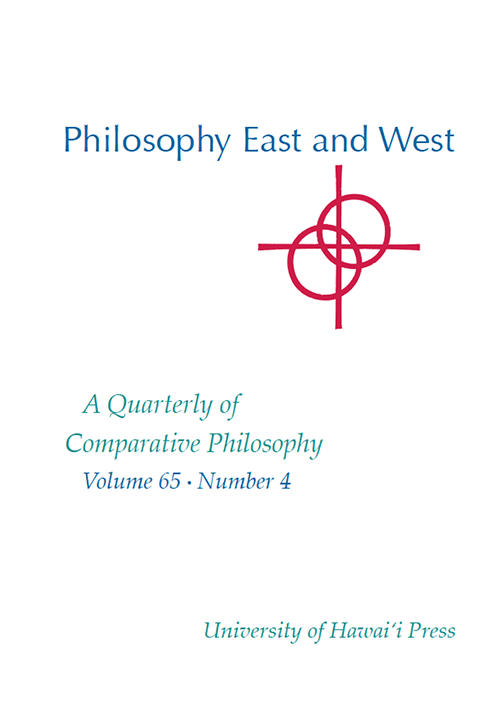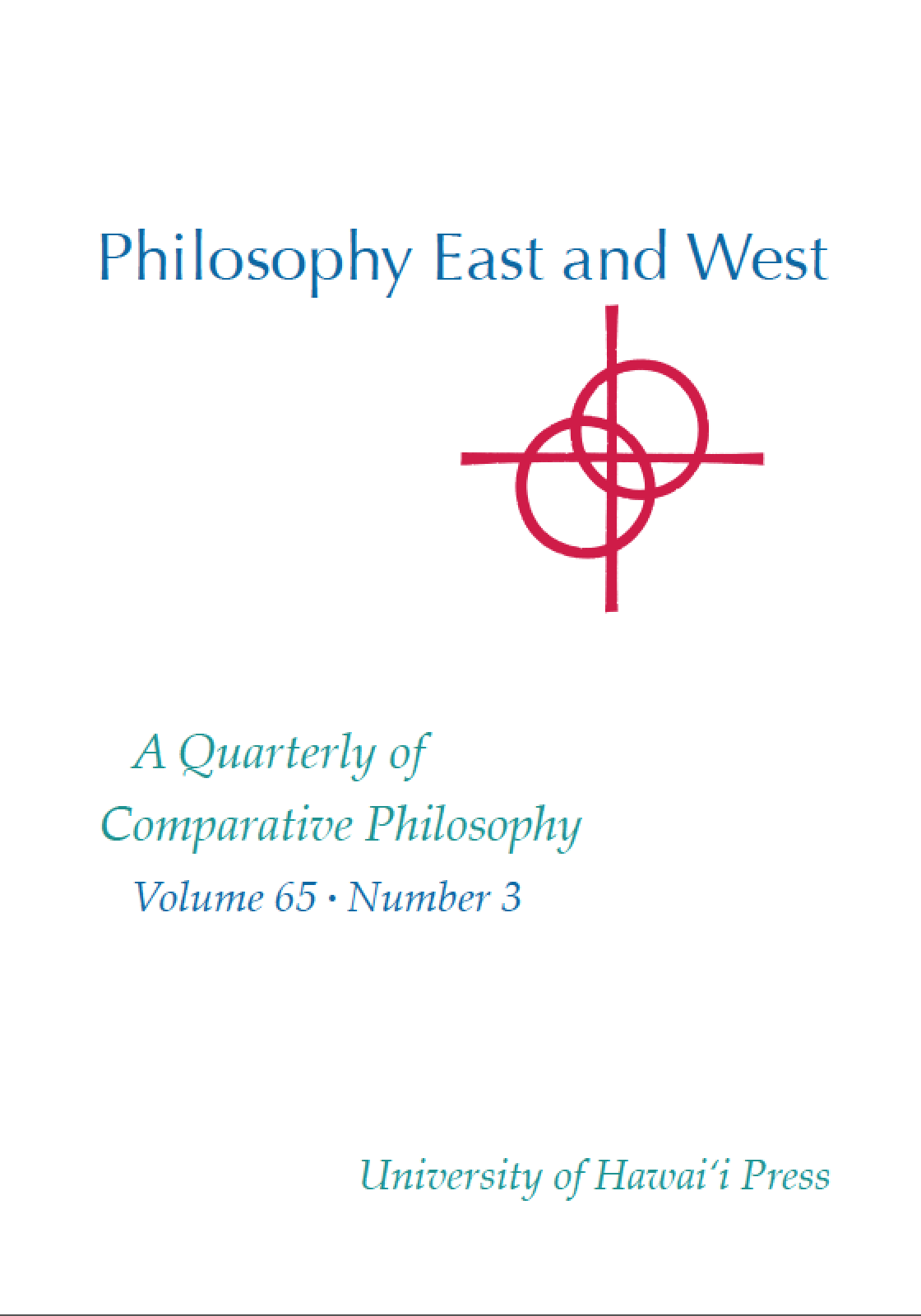ARTICLES
Relational Autonomy, Personhood, and African Traditions
Polycarp Ikuenobe, 1005
The commonplace view of autonomy involves the ability of individuals to be self-governing and self-legislating, and to make freely and reflectively deliberate choices and decisions. This idea of autonomy — that persons are metaphysically free, that is, that they have free will and may use reason to choose how they shall act — is considered to be a defining feature of a responsible person. There is a commonplace view that autonomy (freedom of will and choice) is intrinsically good such that overriding it cannot be justified. This intrinsic value implies a negative sense of autonomy, which involves non-interference with one’s free choices, as opposed to a positive sense, which involves helping or enabling one to make ‘good’ free choices. One feature of communalism in African traditions is its normative conception of person-hood, which indicates how a community, based on its values, obligations, and social recognition, may shape an individual’s identity and choices. Some have argued that this communal view of personhood is inconsistent with or vitiates autonomy because the community strongly determines the choices that individuals make, and in some cases it imposes its will on individuals such that they are prevented from freely making their own choices.
Signs of the Sacred: The Confucian Body and Symbolic Power
Lim Tae-seung, 1030
The sociology of symbolic power, as put forth by Pierre Bourdieu, treats the relations between behavior and socio-cultural structure. Bourdieu comprehends culture as a form of capital that follows certain laws of accumulation, exchange, and operation, and emphasizes that its symbolic form plays an important role in establishing and maintaining power structures. Bourdieu’s concept of cultural capital comprises a variety of resources such as language capabilities, general cultural consciousness, aesthetic symbols, educational information, and level of education. His analysis of cultural capital reveals three different processes of its formation. First, education fosters its formation, internalizing it through the socialization process of individuals and from an early age casting a cognitive matrix to appreciate cultural commodities. In this case, cultural capital exists as an internal property of individual subjects. Second, cultural capital exists in an objective form as, for instance, books and artistic products, which in turn demand appreciation by a connoisseur. Third, in Bourdieu’s theory cultural capital exists as an institutional form, that is, in the form of educational institutions.
A Phenomenological Approach to Illuminationist Philosophy: Suhrawardī’s Nūr Mujarrad and Husserl’s Reduction
Olga Louchakova-Schwartz, 1052
It has been said many times that every system of knowledge needs to be understood in its own terms. This brings up the question of whether textual studies conducted along the lines of the history of ideas, that is, studies of ideas per se, are sufficient for understanding postclassical Islamic philosophy. In this essay, I propose a strategy that would complement and clarify the findings of a historical approach (in a manner similar to the semiotic analyses, for example, by Andrei Smirnov and Ian Netton). This strategy consists of the phenomenological analysis of philosophical meaning as generated by a particular philosopher, including his or her use of philosophical evidence.
Mādhyamikas on the Moral Benefits of a Self: Buddhist Ethics and Personhood
Leah McGarrity, 1082
Given the centrality of the Buddhist doctrine of ‘no-self’ (anātman), those instances in which the Buddha does indeed seem to advocate a self (ātman) have always provided significant sites of hermeneutic inquiry within the Buddhist tradition. They have necessitated a range of sophisticated exegetical tools such as the division of the Buddha’s pronouncements into those of provisional meaning and those of ultimate meaning (neyārtha and nītartha, respectively); the centrality of discerning the Buddha’s real, as opposed to apparent, intention (abhiprāya); and of course the notion of the Buddha’s utilization of his skillful means (upāyakauśalya) specifically to hone his teaching to cater to the different capacities of his various audiences.
Behind Every Great Reformer there is a “Machiavelli”: Al-Maghīlī, Machiavelli, and the Micro-Politics of an Early Modern African and an Italian City-State
Vasileios Syros, 1119
The recent wave of rebellions in the Middle East, commonly referred to as the “Arab Spring,” has stirred up a revival of scholarly interest in the phenomenon of political reform in the Arab world and Muslim-majority states in general. Speculation on the causes of revolution, the provenance and function of political authority, and the means for reshaping or refashioning the existing political or social order had a rich legacy in medieval and early modern Arabic political thought. Islamic history itself provides examples of reforms and revolts that can be seen as antecedents to events associated with the Arab Spring as well as with religious conflicts in Northern Nigeria and Sudan. Thus, a study of the past can provide a frame of reference for understanding the present and tracing the immanent forces in the rise and decline of the state and the evolution of human civilization.
Saving Creativity in Whitehead and Saving Whitehead through Zhu Xi
Gregory Aisemberg, 1149
At the fore of concern within Whitehead scholarship are the main interpretive issues revolving around the relationships of God, creativity, and the world. Some critics have charged that Whitehead’s mature thought suffers from a lack of coherence in his formulation of the relationship between God and creativity as they function in cosmic generativity, a charge proven difficult to overcome. Such critics have posed the following question. In light of Whitehead’s commitment to the Ontological Principle, how can God and creativity stand as separate formative elements in the world’s creative advance? This question illustrates, some say, how the separation of God from creativity within Whitehead’s process philosophy marks an internal incoherence that imperils its very foundations. If Whitehead refuses to regulate agency to anything other than actual occasions, then to have creativity as somehow prior to, separate from, or distinct from God would run afoul of the Ontological Principle and thus prove a devastating mistake.
Nitobe and Royce: Bushidō and the Philosophy of Loyalty
Mathew A. Foust, 1174
In recent years, scholars have increasingly paid attention to the philosophy of Josiah Royce (1855–1916). Long lost in the shadow of fellow classical American figures (e.g., Emerson, Peirce, James, and Dewey), Royce’s philosophy has enjoyed a renascence, with a spate of publications in a variety of venues studying and applying his thought. Like his philosophical brethren, Royce wrote on a wide variety of subjects, his discussions underpinned by a smattering of influences. Much has been remarked of the various Western sources that made an impression on Royce’s thought, but comparatively little has been said of his indebtedness to Eastern sources. Kurt Leidecker’s Josiah Royce and Indian Thought and Frank M. Oppenheim’s “Royce’s Windows to the East” stand as notable exceptions, with Oppenheim’s more recent treatment offering a more comprehensive “chronological survey of Royce’s increasing interest in things Asian.” Still, Oppenheim gives only passing attention to the influence of Japanese thought on Royce’s philosophy. Here, I would like to extend the literature on Eastern influences on Royce’s thought by focusing on what is arguably the most distinctive facet of Royce’s thought: his ethical theory, centered on the virtue of loyalty. In particular, I would like to add detail to what is at present a very sketchy account of the interest that Royce took in Bushidō 武士道 (“the way of the warrior”).
Finding Light, David Grandy, 1194
According to Elizabeth Napper, śūnyatā inheres in “the utter unfindability of objects” owing to their intrinsic emptiness: “If things existed in the palpable, independent way we imagine them to, they would have to be such that they could be found when sought—but they cannot.” She further notes that when objects are subjected to meditative analysis “they disappear altogether,” and “one is left with the absence of what was sought, with a mere vacuity that is emptiness.”
Toward a new Hermeneutics of the Bhagavad Gītā: Sri Ramakrishna, Sri Aurobindo, and the Secret of Vijñāna
Ayon Maharaj, 1209
The Bhagavad Gītā has inspired more interpretive controversy than any other religious scripture in India’s history. The Gītā, a philosophical and spiritual poem of approximately seven hundred verses, is part of the ancient Sanskrit epic, the Mahābhārata. In the Gītā, the Lord Kṛṣṇa, who appears in the form of a charioteer, imparts spiritual teachings to the warrior Arjuna and convinces him to fight in a just war that entails the slaughter of many of Arjuna’s own relatives and loved ones. Śaṅkara, the great eighth-century champion of the Advaita (“nondual”) school of philosophy, wrote the first extant commentary on the Gītā. In this commentary, Śaṅkara interpreted the Gītā strictly in accordance with Advaita philosophy and attempted to refute various possible non-Advaitic readings of the text.
Pure Experience In Question: William James in the Philosophies of Nishida Kitarō and Alfred North Whitehead
Harumi Osaki, 1234
Comparisons of non-Western and Western philosophers often adopt a nation-based framework that has tended to posit difference entirely between national cultures while presuming unity and homogeneity within them. There are a number of problems with such a framework. First, the assumption that national cultures are unitary and homogeneous is demonstrably false. Second, the framework of comparison frequently shifts to Western philosophy versus non-Western philosophy, sometimes articulated at the level of nations (Japan versus the West, for instance), and sometimes civilizations (Eastern versus Western philosophies). As Naoki Sakai has shown, insofar as such a framework presupposes the unity, homogeneity, and naturalness of the West, it introduces a paradigm in which the West is articulated as universal, and other cultures as particulars (Sakai 1989, p. 95). Third, when non-Western thinkers oppose the particularity of their national cultures to the universality of the West, such particularism cannot but be complicit with the universalism it allegedly challenges (p. 105).
Two Kinds of Oneness: Cheng Hao’s Letter on Calming Nature in Contrast with Zhang Zai’s Monism
Zemian Zheng, 1253
Two kinds of life experience of oneness (or unity), frequently described, as well as disputed, by the major figures in the history of Neo-Confucianism during the Song-Ming period—for example Zhang Zai (1020–1077), Cheng Hao (1032–1085), Zhu Xi (1130–1200), and Wang Yangming (1472–1529)—are the focus of the present article. The fundamental characteristic of this experience is a serene feeling of being profoundly united with all things; specifically, the term ‘oneness’ is herein utilized to refer to a state in which Heaven, Earth, and a myriad of things form one body (yiti一體) with the human individual. To further illustrate this notion, I offer a new reading of Cheng Hao’s groundbreaking essay Letter on Calming Nature (Dingxing shu 定性書), a letter to Zhang Zai, in which I argue that, in this very debate with Zhang, one may discern various conceptions of oneness. In addition, my argument shows how Cheng’s refutation of the inner-outer distinction may prove a better starting point for self-cultivation and moral psychology when compared to Zhang’s; this reading characterizes Cheng’s ethics as therapeutic, and as a moderate version of ethical realism based on a non-objectifiable first-person experience, not to be confounded with any radical version of realism.
Comment and Discussion
Between Knowledge and Politics: Reflections on Reading Ming Dong Gu’s Sinologism: An Alternative to Orientalism and Postcolonialism
Zhou Xian, 1273
Having successfully invited many internationally renowned scholars in the humanities and the social sciences to give lectures to Chinese intellectuals two years ago, I toyed with the idea of inviting top European sinologists to give lectures in China. Because of their influence on China studies, this project would have been highly significant in promoting Sino-European cultural exchanges. Therefore, when I met a French sinologist at the Sorbonne, I offered him an invitation on the spot. To my surprise, he turned it down without hesitation. Considering the alacrity with which invited scholars had accepted my invitations in the past, his response made me wonder about the reasons for his refusal. Could it be that he wanted to maintain the images of China that he had formed in his mind and did not wish to see his imagined China collapse when he was brought face to face with the Chinese reality? During our conversation, I noticed that he took much pride in the fact that his scholarship had been praised by noted Chinese intellectuals. This might partly explain his unwillingness to visit China in person. After further conversation, I came away with the impression that for some sinologists like him the main purpose in doing research on China does not seem to be concerned with understanding China in the real sense but with sustaining their already formed method of knowledge production about China, which has been characterized as “Sinologism.”
Feature Review
Cultural Psychology from Within
Sthaneshwar Timalsina, 1281
Book Reviews
Treasury of the True Dharma Eye: Zen Master Dogen’s Shobo Genzo ed. by Kazuaki Tanahashi
Eitan Bolokan, 1286
Ethics Unbound: Chinese and Western Perspectives on Morality by Katrin Froese
Karen L. Carr, 1288
The Chan Whip Anthology: A Companion to Zen Practice by Jeffrey L. Broughton
Steven Heine, 1291
Begriff und Bild der modernen japanischen Philosophie (Concept and image of modern Japanese philosophy) ed. by Raji C. Steineck, Elena Louisa Lange, Paulus Kaufmann
Hans Peter Liederbach, 1293
Establishing the Revolutionary: An Introduction to New Religions in Japan ed. by Birgit Staemmler, Ulrich Dehn
Daniel A. Métraux, 1298
Virtue Ethics and Confucianism ed. by Stephen C. Angle, Michael Slote
Christopher Panza, 1300
John Dewey, Liang Shuming, and China’s Education Reform: Cultivating Individuality by Huajun Zhang
Sula You, 1305
Book Notes
The Dynamics of Cultural Counterpoint in Asian Studies ed. by David Jones, Michele Marion
Jarrod W. Brown, 1309
Ten Thousand Scrolls: Reading and Writing in the Poetics of Huang Tingjian and the Late Northern Song by Yugen Wang
Nicholas Hudson, 1310
Wisdom of the Tao Te Ching: The Code of the Spiritual Warrior by Ashok Kumar Malhotra
Sydney Morrow, 1312
Books Received, 1313-1315
Index to Volume 65, 1316







